Suchao's success inspires other provinces, cities to set up amateur leagues
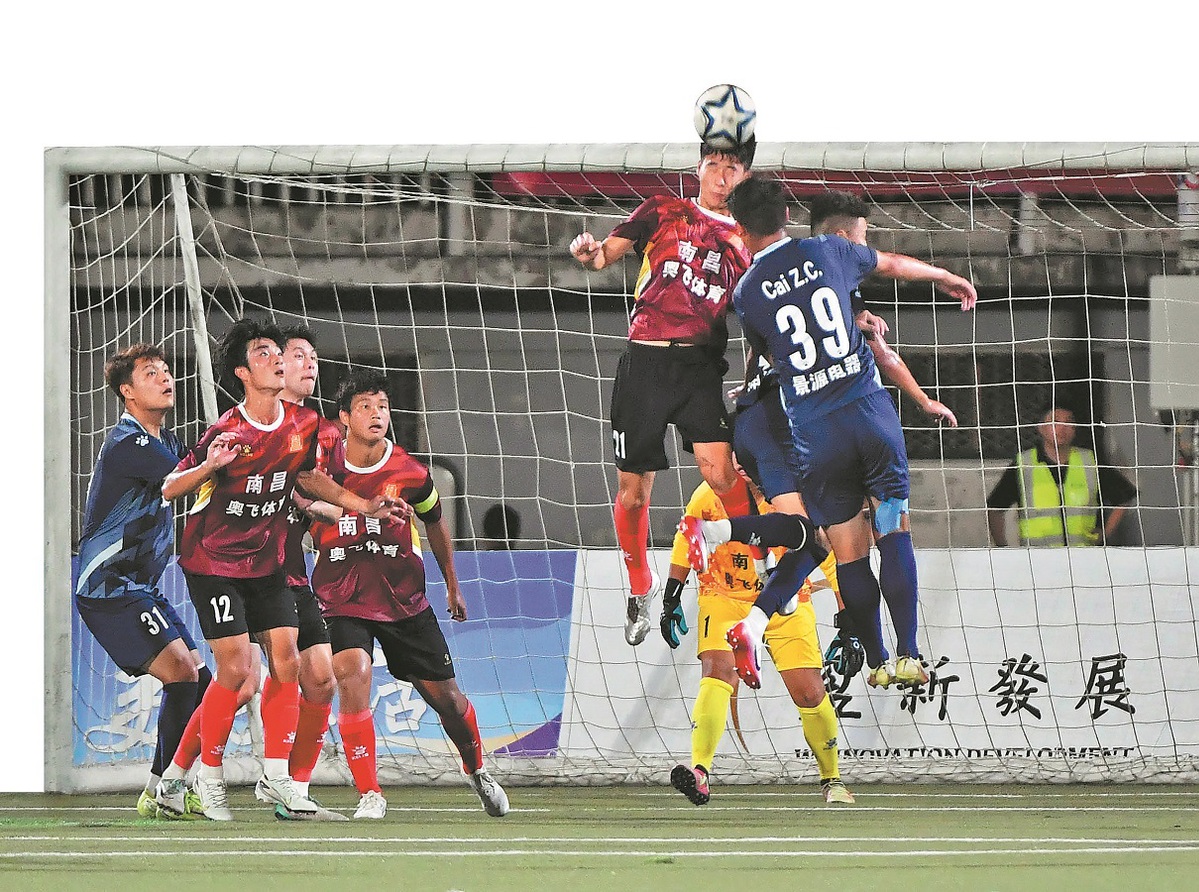
The Jiangsu Football City League phenomenon has ignited a nationwide wave of popular grassroots soccer leagues this summer, and rekindled supporters' passion for the sport.
Dubbed the "Jiangsu Super League" or "Suchao", the amateur provincial league has been a sensation — both online and in stadiums — loved for its huge crowds, exciting play, lively fan exchanges and viral memes.
Now soccer leagues in Jiangxi, Guangdong, and other provinces are also vying for the national spotlight by focusing on fierce inter-city rivalries, innovative formats, or rebranding existing competitions.
During the fourth round of the 2025 Jiangxi City Football Super League on Aug 2-3, more than 70,000 spectators packed stadiums across Yingtan, Shangrao, and Xinyu, with stands echoing with the roars of proud supporters.
The marquee match on Aug 2, when Yingtan hosted Jiujiang, drew 19,108 spectators. Over 1,100 Jiujiang fans traveled on Jiangxi's first soccer-dedicated high-speed train scheduled for the game.
ALSO READ: Sponsors line up for entry into booming 'Suchao' soccer league in China's Jiangsu
"It was timely aid," said Huang Ruilu, vice-chairman of the Jiangxi Football Association. "Originally we planned to organize fan buses to Yingtan, but a one-way trip takes four hours. With matches ending around 10 pm, same-day return was nearly impossible. The special train arrived like coal in a snowstorm," he said.
Team chants and slogans reverberated through the train with no fear of disturbing other passengers. Among the fans was a 100-strong cheer squad of relatives and friends of Nie Haotian, a Jiujiang player.
The 22-year-old Renmin University student scored a crucial goal in a prior match against Jingdezhen.
"We've watched him grow up — we're so proud!" said one of Nie's neighbors "Sister Bao". "We were desperate to cheer him on during the match, to cheer for our city. Because Nie represents Jiujiang, all his loved ones have become fans of the Jiujiang team," she said.
Jiujiang triumphed 4-2 over the home side.
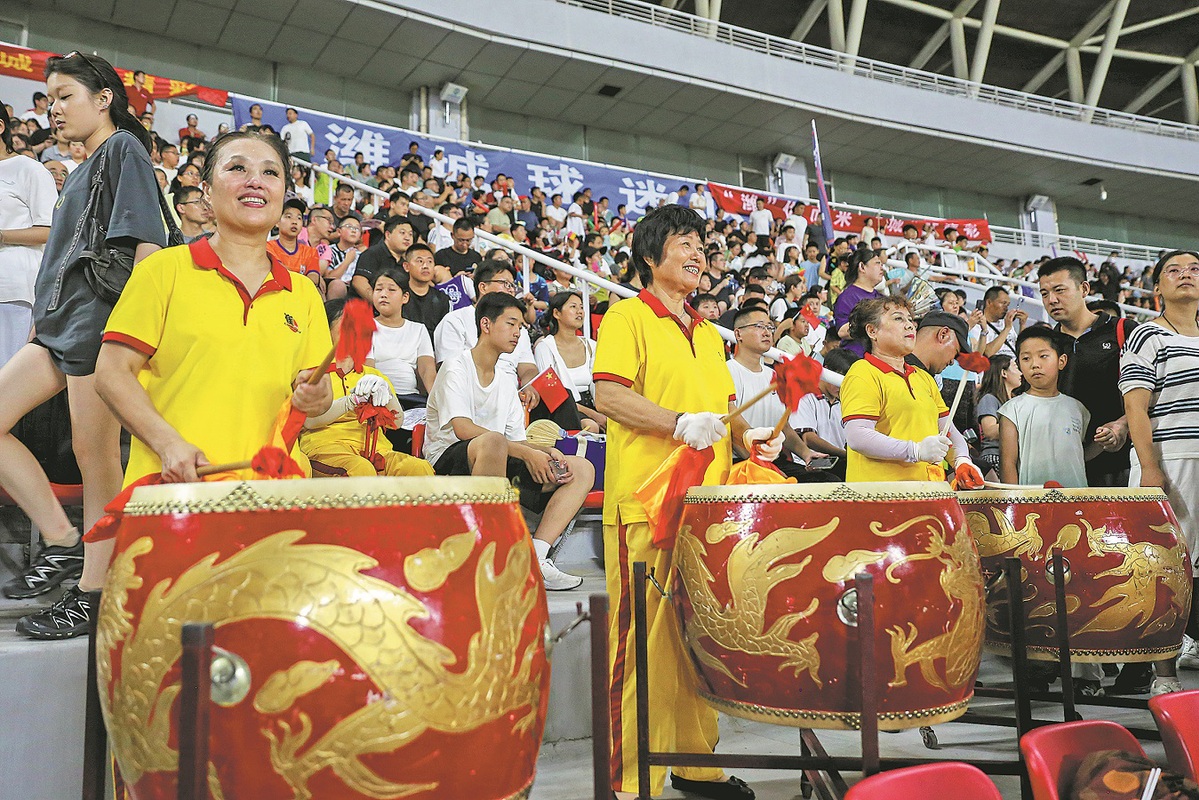
The imitation game
Jiangxi is now promoting its own inter-city league. The province's abbreviated name is "Gan" and the new league is nicknamed "Ganchao", or the Jiangxi Super League.
Since it kicked off on July 12, soccer fever has erupted in the 11 participating cities. The opening round's five matches sold out instantly, attracting 66,960 spectators in total.
One of the Ganchao's aims is to promote city pride and the cultural, tourism and culinary attractions of each participating team. A video posted by the Jiangxi Provincial Culture and Tourism Department on the Douyin platform garnered more than 24,000 likes and 12,000 comments.
Netizens from Jiangsu, famous for their cheeky fan banter, have now set their sights on the upstarts from Jiangxi.
"Finally, it's my turn to ask: What is Jiangxi's provincial capital?" one post read. Another alluded to Jiangsu's economic muscle and better infrastructure by saying, "How many Olympic Sports Centers does Jiangxi have?"
Despite the taunts, Jiangxi's city officials have not taken the bait. However, soccer teams in Jiangxi are carrying on Jiangsu's humorous tradition of ribbing each other.
After a match in Ganzhou, Pingxiang's official WeChat account published an open letter affectionately addressing Ganzhou as "Gan Gan", praising its navel oranges and recounting shared cultural and historical bonds.
Hours later, Ganzhou's account replied warmly to "Ping Ping", saying they were eagerly awaiting their next match in Pingxiang.
Netizens were moved by the cities' overly polite exchanges.
"LOL (laughing out loud), reading this feels like Gan Gan and Ping Ping are in a romantic relationship," commented one netizen. "The warmth in their interaction perfectly captures that blend of competition and intimacy between cities — like bickering lovers in a down-to-earth courtship. It's so warm and romantic."
The Jiangxi league's official slogan is: "In the name of football, fight for our city". Jin Ziwei, deputy director of the Jiangxi Provincial Sports Bureau, said the slogan aims to enhance urban pride among players and spectators, while showcasing the province's attractions.
The teams are made up of amateur players, with the average age 23, Jin said. Sixty percent are students while the others include teachers, chefs, taxi drivers, railway workers, businessmen, employees and civil servants.
Starting on July 12 and running for 110 days, the league's 66 matches are mostly played on weekends to facilitate fan travel and tourism.
After only four rounds, soaring attendance has triggered stadium upgrades across multiple host cities — from temporary stands to 20,000-seat sports centers.
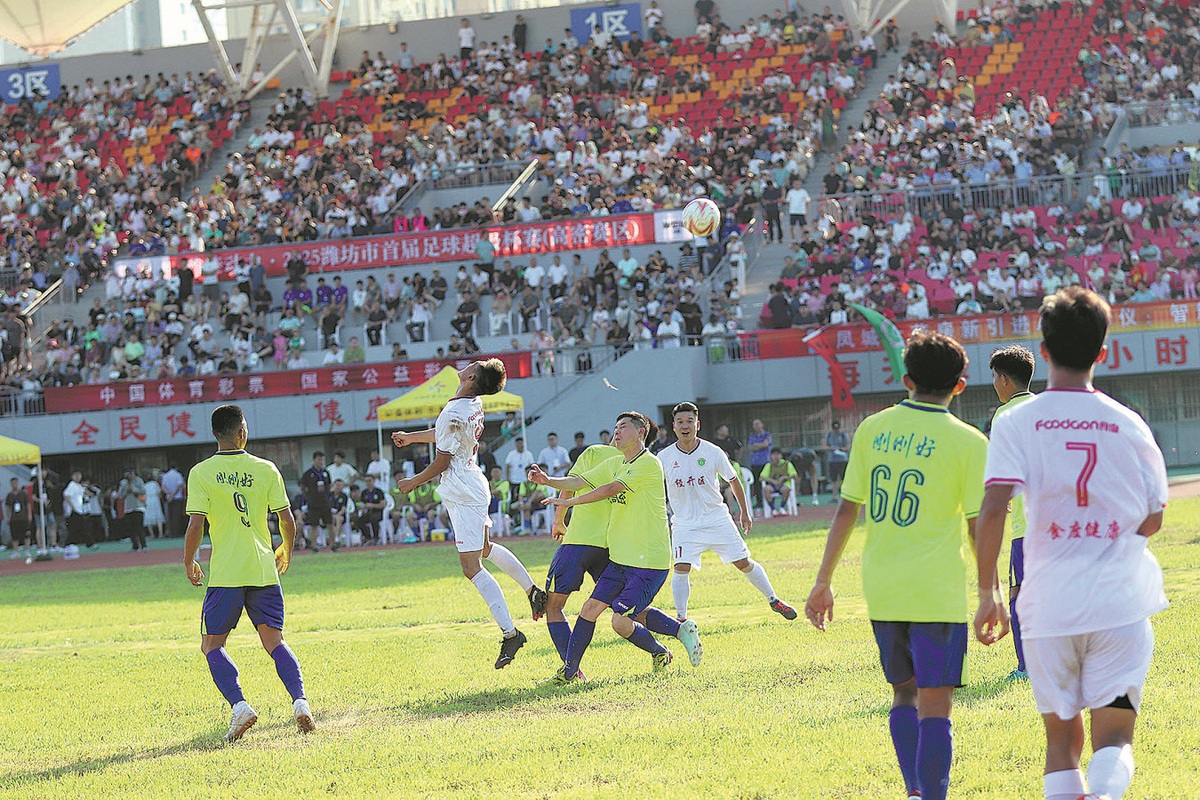
Awaiting new memes
The viral success of Suchao is closely linked to its funny memes, and emerging leagues are cultivating their own humorous banter.
On July 29, the Hunan Provincial Sports Bureau released regulations for the 2025 Hunan Football League, scheduled to run from September to December.
The youth-focused tournament will showcase "Xiang-style" soccer through sports-education and sports-tourism integration, while stimulating urban economies and regional cultural exchanges. The province is also known as Xiang, and the league is dubbed "Xiangchao", or the Hunan Super League.
However, even before a ball has been kicked taunts are being widely circulated on social media. Zhuzhou players face the ignominy of being referred to as "Zhu teammates" — a pun on "useless teammates" — and Zhangjiajie is being labeled "Global Zhang", an allusion to its national park's UNESCO World Heritage status and visits by 1.83 million international tourists in 2024.
Provincial capital Changsha (in Chinese, "sha" has the same pronunciation as "kill") faces relentless online teasing, with jokes about being "slaughtered by Zhuzhou", "swept by Hengyang", or "sliced by Shaoyang". The humorous digs are fueled by Changsha's economic dominance over the other cities and Hunan people's competitiveness.
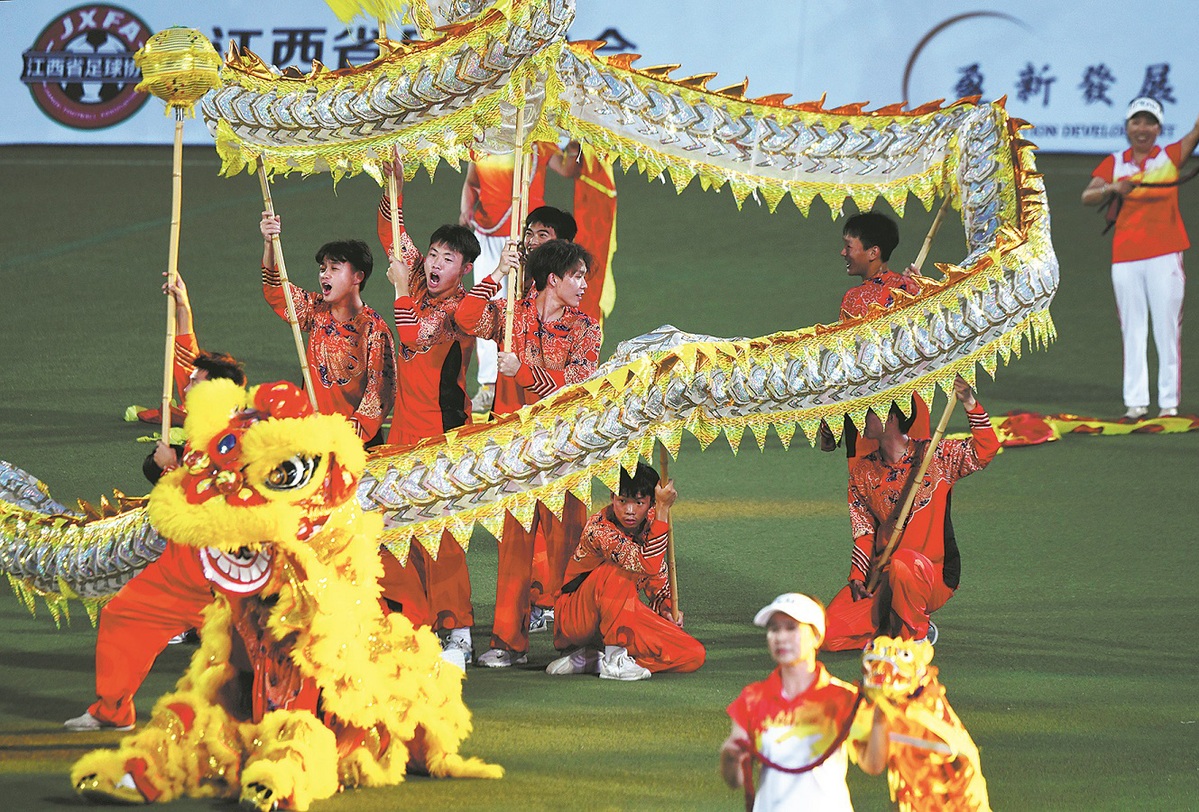
"Watching Suchao feels like touring a city expo; watching Xiangchao feels like witnessing the defense of Changsha," quipped one netizen.
Referencing Suchao's most famous jibe — "Competition first, friendship fourteenth" — they joked Xiangchao follows "Friendship first, competition second, Changsha fourteenth".
Preparations are already underway for the start of the competition, with players enduring summer heat to hone their skills, embodying Hunan people's reputation for being able to endure hardship with a resolute fighting spirit.
Meanwhile, cities nationwide are also following the Suchao model.
Harbin, Heilongjiang province, launched its seven-a-side "Hachao" tournament on July 12, which features 32 teams in youth, adult, and senior divisions.
In Weifang, Shandong province, the "Victory Football Super Cup", dubbed "V Chao", ignited citywide passion with its core philosophy: "For every citizen, fight for our hometown".
As Shandong's first prefecture-wide home-and-away league, it includes teams from all 16 Weifang counties or districts. The opening match drew nearly 30,000 fans.
"This tops watching the Chinese Super League!" exclaimed fan Zhang Lei. "These players are our neighbors — delivery guys, teachers, factory workers… Seeing them pour their hearts out for our hometown is electrifying!"

Games without frontiers
The latest provincial league to launch is the 2025 Guangdong Football Super League which started on Saturday and runs for four months.
The competition has taken a different approach by calling itself the "Shengchao", or Provincial Super League and undertaking a qualification and knockout format. It was organized by the Guangdong Football Association with municipal sports bureaus and local soccer associations as co-organizers.
Unlike the city-based format in Jiangsu, the new Guangdong league features amateur clubs.
"Registration enthusiasm was extraordinary this year. By late June, we had 26 teams applying — 18 more than last year," said Liang Junjie, head of the association's commercial development department. Two teams from the Hong Kong Special Administrative Region sought entry but couldn't join due to procedural complexities, he said.
After rigorous vetting, 22 teams from 13 of Guangdong's 21 prefecture-level cities were selected. From Aug 9 to 17, matches will be played in two venues in Meizhou and Zhaoqing, to select 11 teams who did not participate in the provincial league last year.
Those 11 teams, and five teams who participated in last year's competition, will play each other from Aug 23 to Sept 27 to decide the top four.
The semifinalists will play home-and-away games from Nov 2 to Nov 29, to determine the winner and have the chance to represent the province in the 2026 Chinese Football Association Member Association Champions League, the highest-level national amateur soccer competition. Nearly 70 matches will be played to determine the finalists.
"Previously, all matches used home-and-away formats, burdening teams with high venue rental, security, and travel costs," said Liang. "This year, only the semifinalists play home-and-away fixtures, drastically reducing expenses."
In 1999, Guangdong staged China's first regional competition organized by a provincial soccer association.
Xie Changjing, chairman of the Guangdong Football Association, said the new competition serves as the primary platform for amateur clubs to advance into professional leagues.
The league enforces strict amateur eligibility rules to ensure fair competition. Each team may register up to three players from Hong Kong, Macao, or Taiwan, with two permitted on the field at the same time.
Off the field, the league will collaborate with municipal culture and tourism departments to integrate sports, culture, tourism, agriculture and commerce.
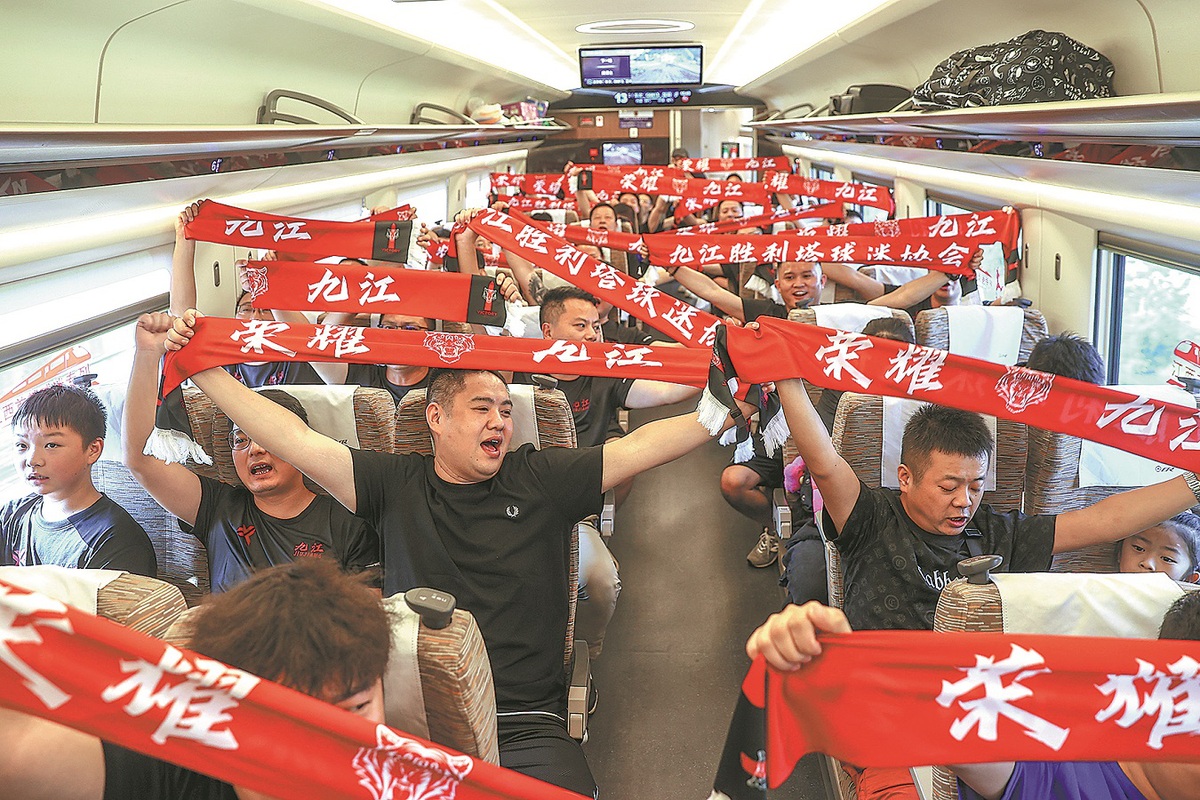
An innovation
"The popularity of the Suchao is a remarkable development in China's grassroots sports scene," said Michał Dahl, an associate professor from Alberta International School of Recreation, Sport and Tourism of Beijing Sport University.
"It has rightly gained attention not only across the country but internationally as well," he said.
The total number of spectators for the first eight rounds of Suchao exceeded 1 million. At Nanjing's sixth-round home game, the crowd reached 60,396, a new attendance record for an amateur soccer match in China.
Dahl said leagues such as the Suchao offer a refreshing model grounded in community spirit and shared joy.
"Its success speaks to a growing appetite for community-based, inclusive sports experiences that go beyond elite performance and commercial spectacle," he said.
"While competition is at the heart of the league, what truly matters is the emotional bond that fans form with their cities and teams — this deep connection fosters civic pride and a sense of belonging," he said.
Dahl said he believes the relative wealth of Jiangsu's cities has played a vital role in the league's rise. With 13 cities of comparable economic strength, all ranking among China's top 100 cities by GDP, the province has long nurtured a spirit of regional competition.
"The Suchao has simply channeled this energy into sport, creating a healthy, celebratory form of rivalry that fuels both passion and pride," he said.
The development of amateur leagues like the Suchao is a valuable contribution to both national well-being and global sports culture, he said.
"Rooted in inclusivity, diversity, and shared passion, this model offers a vision of sport that is more community-centered and accessible. It opens the field to everyone — not just professionals or celebrities," he said.
He said that other provinces in China would do well to follow this model. With over 100 cities having more than 1 million residents and only 16 professional soccer teams in the top-tier league, there is enormous potential to engage untapped fan bases. However, he said it's important to recognize that replicating Jiangsu's success may require careful adaptation to local situations.
"Establishing similar leagues could help popularize soccer and expand its reach," said Dahl.
He Chun in Changsha, Zhou Huiying in Harbin, and Zhao Ruixue in Jinan contributed to this story.


